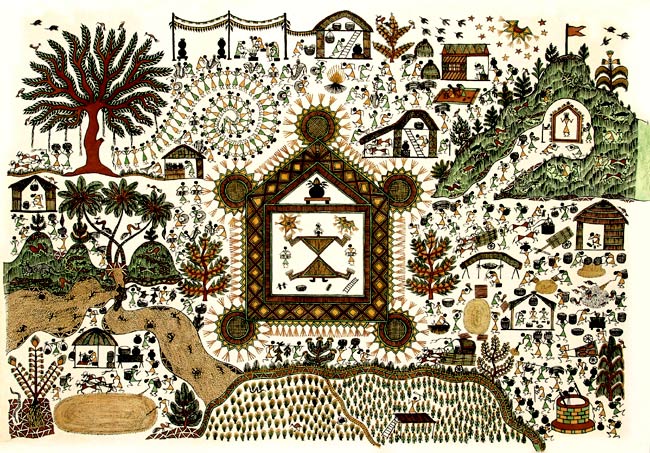
Image Courtesy - Google
In the concrete jungle that the urban city has become, one tends to feel rather alienated from a natural eco existence. In fact, for people born and raised in urban spaces this is the only environment – and hence way of life one knows. Our household, cultural, educational and work related activities engage a significant proportion of our time. These life-style choices drive our interaction with the surrounding and consumption patterns. Hence, for millions of folks the urban experience is limited to their home, place of purpose and mode of commute.
‘What is this life if full of care, we have no time to stand and stare’ is a line from a poem called leisure written by William Henry Davies. Quite true, with regard to two aspects -
1) We have no time and
2) We do not have a lot to stare at, for there are quite a few surroundings that are a mere conglomeration of garbage and development debris.
Such was however not the case in every scenario, day and age. History offers us some fascinating insights in ways of living that were wisely connected with nature.
For example in the 3rd century A.D. in Ancient India groves and orchards were considered as sacred spaces where the local deities were placed. The domestic and monarchic setups within such a culture worked to protect the ecological surrounding that comprised of plants and animals. These spaces were better known as the ‘sacred groves’ and people took their interaction with them very seriously. They were exempted from tax duties and even as of the present day they serve as rich reservoirs of seeds, saplings and plant posterity. Planting trees and donating groves earned merit. A culture such as this inspires and encourages one to live in joyous harmony with nature. Within the Sarguja district within Madhya Pradesh every village has 20 hectares of these groves. They’ve also been seen at Gani and Mangaon in Maharashtra.
One need not just look at an ancient culture to understand human life that is in harmony with nature. Even as of today there are many societies that function as part of nature and not independent from it – Meghalaya’s living bridges are a fine example of the same. Known to receive the highest levels of rainfall, the residents of these states make bridges out of fig tree roots to tackle floods. The Warli tribe from Dahanu and Talasari district, Thane also holds nature in high regard with respect to their culture and occupation. They teach their young ones to live in harmony with nature and not to fear its forces. In fact, at birth a male child is gifted an axe and a girl child a sickle to establish the connection with nature at a very nascent stage.
These examples bring us back to the urban city and our zone of familiarity. How do we make our existence more natural? We ought to take some time out to engage more with our surroundings and not live oblivious to them. We need a shift in our consciousness to change our thinking and finally impact our actions and lifestyle. We ought to make a serious audit on our consumption patterns and seek for a sustainable existence.
What we need is strong individual and collective action. A few small steps such as planting trees in the neighbourhood, composting, reducing consumption of plastic to the bare minimum, reducing waste , buying organic food , reusing & recycling , sharing, making our commute eco-friendly will definitely help the ecology around us and who knows it could be a very fun endeavour to get to know who your neighbour is.
None of these steps refer to an austere, serious life. Living in harmony with nature brings immense joy, peace and a sense of connectedness. We shape the world we inhabit – through conscious effort or inaction. Let’s honour the planet by conscious participation in the creation of a new world. In doing so the biggest gift will be to our self.
 Clean Planet supports HT’s – No TV Day initiative. It’s time to turn the box off and turn life on or like how we say it here – TV Off, Planet On! This could be a wonderful day to make the most of the outdoors, enjoy the weather and have a fantastic day out. Or you could choose to stay back home and do all the little things you love that make you happy. What would you rather do, other than watch tv today? Check out what folks have to say about what they’re about to do right here – www.notvday.in
Clean Planet supports HT’s – No TV Day initiative. It’s time to turn the box off and turn life on or like how we say it here – TV Off, Planet On! This could be a wonderful day to make the most of the outdoors, enjoy the weather and have a fantastic day out. Or you could choose to stay back home and do all the little things you love that make you happy. What would you rather do, other than watch tv today? Check out what folks have to say about what they’re about to do right here – www.notvday.in








